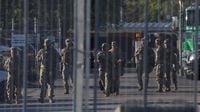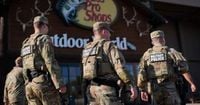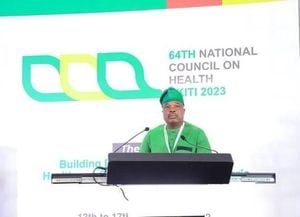In a dramatic legal showdown that has gripped the nation, a federal judge in Chicago has temporarily blocked the Trump administration’s deployment of National Guard troops to Illinois, intensifying the debate over the role of the military in domestic law enforcement and the limits of presidential power. The two-week restraining order, issued by District Judge April Perry on October 9, 2025, comes amid ongoing protests outside Immigration and Customs Enforcement (ICE) facilities and parallel court battles in Portland and Memphis, thrusting the issue of federal intervention in Democratic-led cities into the legal and political spotlight.
Judge Perry’s ruling—effective for 14 days—came after she found “no credible evidence that there is a danger of rebellion in Illinois,” directly challenging the Trump administration’s justification for the deployment. According to The New York Times, Perry described the federal government’s version of events as “simply unreliable,” and cautioned that the presence of National Guard troops would “only add fuel to the fire.” She further noted that provocative ICE enforcement activity in Illinois had already heightened tensions, and that the arrival of troops would likely exacerbate civil unrest, requiring a response from local and state law enforcement.
The Department of Justice quickly filed a notice of appeal late Thursday, signaling that the legal battle is far from over. Before the restraining order, approximately 500 National Guard troops were already present in Chicago—200 from Texas and 300 from Illinois—raising questions about their status and activities in the wake of the court’s decision. The Department of Defense, when pressed by CNN, declined to specify whether any Guard members remained inside the ICE facility in Broadview, stating, “As a matter of longstanding policy, the Department does not comment on ongoing litigation.”
The Trump administration has argued that the deployment is necessary to protect federal agents and property from what it calls “coordinated assaults by violent groups intent on obstructing Federal law enforcement activities.” In court, Justice Department attorney Eric Hamilton pointed to “brazen hostility” and “tragic lawlessness” in Chicago, citing agitators who brought guns to federal facilities, threw rocks and fireworks at federal agents, and blocked ICE operations. “All of which has shown that in Illinois there is an unprecedented and blatant disregard for law and order,” Hamilton contended.
Illinois officials disputed this characterization. The attorney for Illinois, Wells, argued that the situation outside the ICE facility in Broadview had calmed significantly since local authorities restricted protest hours and the Illinois State Police began providing protection. The judge’s order reflected this, referencing the “dynamic situation” on the ground but maintaining that federal evidence did not support the need for military intervention.
The legal wrangling in Chicago is mirrored by a similar courtroom drama in Portland, Oregon, where a three-judge panel from the Ninth Circuit Court of Appeals is deliberating whether to lift a lower court’s order blocking the deployment of 200 federalized Oregon National Guard troops. The state of Oregon has argued that the federal deployment is part of a “nationwide campaign to assimilate the military into civilian law enforcement” and is based on “inaccurate information” about local conditions. In a recent filing, Oregon’s lawyers warned, “The public interest is served by a judicial order preserving the rule of law in the face of unprecedented and unlawful Executive action that threatens grave and irreparable damage to our State and the Nation.”
The Trump administration, for its part, has asserted that Congress did not impose limits on the President’s authority to federalize the Guard, nor did it authorize federal courts to second-guess presidential judgment in response to violent resistance. The appeals court has yet to issue a ruling, but even if the administration prevails, another district court order remains in place blocking the Guard’s mobilization in Oregon until at least October 19.
As these legal battles unfold, National Guard troops in both Chicago and Portland have been left in limbo. Military officials told CNN that soldiers are “planning and training” but “not conducting any operational activities” due to the court orders. “Our soldiers are conducting planning and training but not engaging in any Federal Protection Mission operational activities,” US Northern Command said in an update.
The deployment of the National Guard to Memphis, Tennessee, has added another layer to the unfolding story. On October 10, Guard troops began patrolling with local police as part of a federal task force to reduce violent street crime. The deployment, backed by Republican Governor Bill Lee but not requested by Memphis Mayor Paul Young, has stirred debate over the appropriate use of military resources in civilian settings. Police Chief Cerelyn “CJ” Davis expressed hope that Guard personnel would help direct traffic and maintain a presence in retail corridors, rather than operate checkpoints or make arrests. Guard members, clad in military police fatigues and protective vests, were seen near prominent landmarks but were not actively enforcing laws.
Meanwhile, protests have continued outside the ICE facility in Broadview, Illinois, which has become a flashpoint in the broader debate. Demonstrators have gathered regularly, and local police have monitored the scene. The facility itself has been at the center of legal and political controversy: a federal judge recently ordered the removal of an 8-foot-high metal security fence erected by ICE without local government permission, siding with the village of Broadview’s complaint.
High-profile political figures have weighed in on the controversy. President Trump, in a Truth Social post, threatened to jail Illinois Governor JB Pritzker and Chicago Mayor Brandon Johnson for opposing the troop deployments. Pritzker shot back on X, “I will not back down. Trump is now calling for the arrest of elected representatives checking his power. What else is left on the path to full-blown authoritarianism?” In a televised interview, Pritzker declared, “If you come for my people, you come through me. So, come and get me.”
Democratic Senators Tammy Duckworth and Dick Durbin visited the protest site in Broadview, voicing strong opposition to the administration’s actions. Duckworth, an Iraq War veteran and former Illinois Army National Guard lieutenant colonel, condemned the use of the Guard in American cities, stating, “They are trying to normalize an extension of presidential power that is not appropriate under the Constitution.” Durbin called the deployment “totally unnecessary,” adding, “This political theater may have a lot of opportunities for television and such, but it doesn’t get the job done in fighting crime.”
The legal and political reverberations have not been limited to Democratic voices. Republican Oklahoma Governor Kevin Stitt criticized the deployment of Texas National Guard troops into Illinois, arguing it sets a troubling precedent for states’ rights. “Oklahomans would lose their mind if Pritzker in Illinois sent troops down to Oklahoma during the Biden administration,” Stitt told The New York Times.
Adding to the complexity, former military leaders filed an amicus brief on October 9, urging caution about the broader use of the National Guard in domestic operations. They warned that such deployments threaten the Guard’s core national security and disaster relief missions, risk politicizing the military, and could undermine recruitment, retention, and morale.
As the courts weigh the evidence and the nation watches closely, the fate of the National Guard’s domestic role hangs in the balance. The next two weeks are likely to prove pivotal in determining how far the federal government can go in deploying military forces within U.S. borders, and whether the courts will serve as a check on executive authority in times of domestic unrest.





